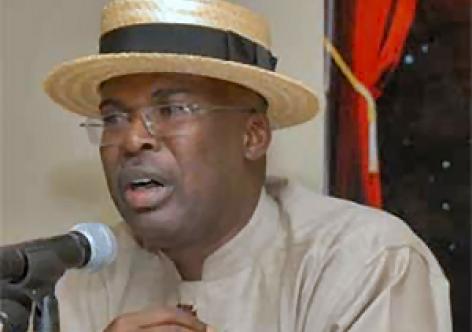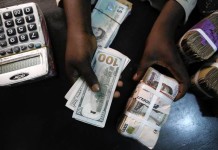By Jeph Ajobaju, Chief Copy Editor
Nigeria has stumbled on new 3.37 trillion standard cubit feet (tcf) of gas reserves while drilling for crude oil, bringing the total to 206.53tcf from 203.16tcf last year, and inching towards the target of 2020tcf reserves by 2030.
Minister of State for Petroleum, Timipre Sylva, who made the disclosure, also explained that gas flaring has since been reduced to the minimum to ensure maximum benefit from the natural resource.
Nigeria has more gas reserves yet to be discovered, he said, even though the world is shifting away from fossil fuel to green energy produced by wind, water, and solar.
The Department of Petroluem Resources (DPR) had announced that gas reserves rose 7.3 per cent from 187tcf to 200.79tcf as of January 1, 2019.
Then-DPR Director Mordecai Ladan said Nigeria is a gas producing nation because of its potential unproven gas reserves which are more than crude oil reserves.
New DPR Director Auwalu Sariki disclosed on June 12 this year that gas reserves have grown to 206.53tcf and indigenous oil and gas firms now contribute 33 per cent to crude oil reserves and about 30 per cent gas reserves.
Local firms contributed 10 million barrels of gas in 2005 which rose to about 62 million barrels in 2020.
Also in 2020, total gas reserves notched 203.16tcf, an increase of 1.16tcf or 0.57 per cent from 202tcf in 2019, a growth of over 3tcf.
“Nigeria attained the target of 200tcf of natural gas reserves by the Reserve Declaration as at January 1, 2019, before the 2020 target. Thereafter, government set a target to attain a Reserve Position of 2020tcf by 2030,” Auwalu said.
Gradual transition to renewable energy
The DPR had disclosed that as of January 2019, daily gas production stood at 1.2 billion scf, 41 per cent of which was exported, 48 per cent went to the domestic market, and 11 per cent flared.
However, Sylva told the News Agency of Nigeria (NAN) in the latest update that the Ajaokuta, Kaduna, Kano Gas Pipeline (AKK gas pipeline) will eliminate gas flaring “completely” by absorbing the 8 per cent still being flared.
“We have a lot of gas in this country. We have 206 trillion cubic feet of gas reserves,” he said, as the NAN copy is reported by The Guardian (Nigeria).
“This number is already discovered in gas reserves and this 206 trillion cubic feet reserve was found while looking for oil, so it was accidentally discovered.
“We were actually going to look for crude oil and we found gas, and in that process of accidentally finding gas, we have found up to 206 tcf.
“So, the belief is that if we really aim to look for gas dedicatedly, we will find up to 600 trillion cubic metres of gas.”
Sylva explained that Nigeria’s transition from gas to renewable fuel will be gradual when it has fully utilised the benefits f gas.
“We are also transiting and that is why we are talking about gas. We are seeing gas as a bridge to renewable fuels.
“We came from coal, which is solid, to crude oil; now we are moving to gaseous gas and then to renewables.
“The belief in the industry is that if we have this kind of vast resource and we have not tapped it, why should we abandon it and move to renewables.
“We have not used gas to drive our cars and few people use it to cook; we have not used gas to generate electricity or used it to fire our fertiliser blending plants, then why should we abandon it and move to renewables?”
Sylva argued that Western countries are in a position to move to renewables after using coal and crude oil to stabilise electricity supply.
But, he stressed, Nigeria is in a situation where a lot of people do not have access to electricity yet.
“So, what we are saying is that we agree to transit but let us use our gas first to develop our country and get the benefits of development, that point where everybody has electricity, then we can transit to renewable fuel.”
Sylva said as gas is being used as transition fuel, Nigeria and Africa do not contribute more than 1 per cent of global warming as carbon emission.
Nigeria aims for African, European gas markets
Nigeria aims to sell gas across the Sahara and in Europe through the AKK gas pipeline being constructed to augment receipts from oil, the country’s main foreign exchange earner.
“The plan is if we can get it to Kano, then it can continue all the way to Algeria at the Trans-Saharan gas pipeline and then link up with the Algerian pipeline and then we move it to Europe,” Sylva explained.
“So, our gas can move all the way from the South to the European market. So, it is a very important piece of infrastructure and the president is very committed to it and it is very much on track.”
Sylva told NAN – as reported by PREMIUM TIMES – that the pipeline is one of the legacy projects of the administration of President Muhammadu Buhari and it will serve as a development backbone along the Southern-Northern corridors.
“AKK gas pipeline is good for producers and the market because we have a lot of situations where gas is capped in the South and not produced because there is no market.
“But what we want to do now is to bring the gas across Nigeria, so that when you are now moving gas from South to North, all the people along that corridor can key into that pipeline.
“What that means is that people will have access to gas anywhere in Nigeria. It will also enable Nigerians to invest in a gas-based industry anywhere in Nigeria.
“This is also good for the producer because he now has incentives to produce more. Before now, the gas in the South was capped but with this backbone, anybody can produce and link up with the AKK pipeline.”
Elimination of gas flaring
According to Sylva, the AKK gas pipeline will eliminate gas flaring completely, noting that “gas flaring … so much exaggerated. Gas flaring has been reduced to about 8 per cent. We have taken down about 92 per cent of flares.
“Gas flaring is no longer the major problem of our communities today. There has been a lot of monetisation on gas.
“All the gas that was going into NLNG was previously flared, all the gas going into the power plants was previously flared, and there is a lot of gas also being re-injected into the ground so that we don’t flare it.
“We also use some of the gas to spike crude oil, so we have found a lot of use for gas which brought flaring down to 8 per cent, but people still exaggerate it.
“Before now in my own community, I saw the flares in the horizon when I stood by the Atlantic, but today it’s no more.”
Sylva urged Niger Delta communities to tap into opportunities created by gas utilisation projects and stop complaining about the dangers of gas flaring which has almost been eliminated.
“Gas flaring is no longer a problem in the Niger Delta, 8 per cent of gas being flared cannot be the problem.
“If I don’t know what to do with my gas that is when I flare, but if I can monetise my gas, why should I burn it when I can make money out of it.
“In fact, it is in my interest not to burn my gas because it now has value. The problem with gas before was that it had no value because nobody was buying it.
“But now, if I can monetise it, I will be guarding it so that I can get some benefits from it.”













